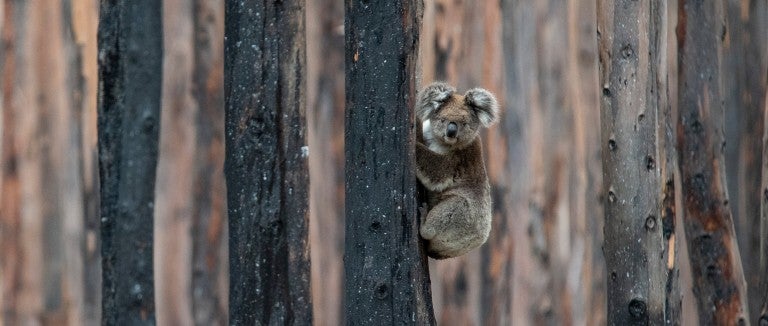Extreme weather events like wildfires can kill wild animals, either from the fire itself, through smoke inhalation or through loss of habitat. Animals who are very young, old or otherwise unable to move away quickly are particularly vulnerable.
Wild animals cope with wildfires in a variety of ways. Most birds will escape easily by flying away. Mountain lions’ keen sense of smell makes them among the first animals to perceive the threat of a fire, but development and roads can block their safe escape. Other large mammals, such as elk, typically run to escape or wade into streams or lakes to wait out a passing wildfire.
Small creatures such as chipmunks, ground squirrels, mice and lizards can often survive a wildfire by going into underground burrows, where temperatures can remain as low as 70 degrees. Some may hide under rocks, and, when possible, amphibians bury themselves in mud.
How can I help wildlife before or during a disaster?
- Do everything you can to allow fleeing animals to pass through. Wild animals have strong fight or flight responses and are extremely resilient; many will have the ability to escape the flames.
- If you see animals that are injured or clearly compromised, call your local animal control or wildlife rehabilitator. Signs that a wild animal may need intervention include compromised breathing or unstable walking, which could be due to burned pads, soles or hooves.
- Clear fire buffer zones around your property. Based on the habitat and fire history, these could be 10-foot buffers to 100-foot buffers. Cut vegetation low and remove unnecessary fuel, stacked firewood, abandoned vehicles and other clutter.
- Honor and promote fire bans during high fire-risk weather.
- Have water reservoirs and the capability to wet down buildings and habitat when a fire is approaching.
- Before evacuating, fill shallow containers (or stock tanks, if they have wildlife ladders in them) with water. Drinkable water can mean extended life in burnt-out areas.
- Fill up bird feeders. More birds than you imagine are aware that there is a source of food available in your yard.
Additional resources
- Pet disaster preparedness: Prevent tragedy by preparing for a disaster or everyday emergency before it happens
- Equine disaster preparedness: Horses require extra consideration in disaster planning
- Community cat disaster preparedness: You can help community (feral and stray) cats before and after a hurricane, earthquake, flood or other disasters
- Livestock disaster preparedness: Be prepared in the event of an emergency
